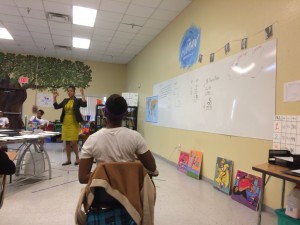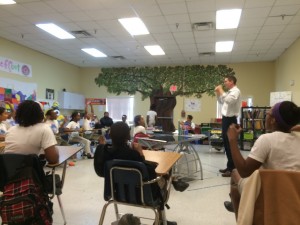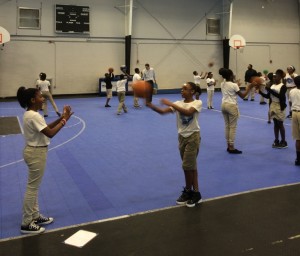
Last year, two teachers began talking with their fifth graders about their rise to middle school. The students spoke about steeling themselves for fights, and about the violence faced by their older siblings.
It was then that Danita Jones and Nathan Smith decided to leave behind the charter school where they taught, put their livelihoods on the line and offer their students something different.
They decided to launch a school where children would feel safe for nine hours a day, where sixth-graders would feel comfortable sharing a hug or telling their classmates about their feelings, and where students’ tendencies to sing or rap or beat on their desks could become part of the lesson plan.
They canvassed the neighborhoods of inner-city Orlando and shared their idea with parents, some of whom offered to help with carpools and stock a classroom food pantry.
That was the beginning of The Human Experience, a one-room, 20-student private school that spent its first year in the Frontline Community Center in the Washington Shores neighborhood. Next school year, the tag-teaming duo of teachers is set to see their experiment double in size.
In its first year, the school has made the local paper and ABC’s World News Tonight. It has pulled together donations to help pay for things like technology and facilities. The sixth-graders have visited college campuses, and begun to picture themselves there. The students have lent their voices — not to mention dance moves and video production skills — to the cause of school choice, which for them is personal.
“This has been a real team effort — a lot of people who believe that everybody can learn,” Jones said.
Questions remain going into the school’s second year, from what facility it will use to how much money it will raise for supplies through its latest crowd-funding effort.
But the school plans to open its doors to students again next year, and add a new group of sixth-graders while its existing students rise to seventh. The two teachers are expected to continue to juggle instructional and administrative duties.
As for the students, Jones said they’ve started to realize “their dream is not a fantasy. It can be a reality, if they’re willing.”
***
Adults who walk into The Human Experience will most likely be hugged. They will probably join the students in song. They will likely be asked to give the class an impromptu presentation on what middle school was like for them, and what it took for them to get to college.

The students will pose questions: Did you ever have a bad teacher? How did you deal with the pressure to be cool? Did you ever consider attending a historically black university?
It’s no accident the sixth-graders are asking about college. “Professional development” sessions with adult visitors are, along with church-sponsored college field trips, part of a concerted effort to broaden the students’ horizons and get them thinking about their futures.
A bachelor’s degree will be for these students what a high school diploma was a generation ago: A ticket to the economic mainstream, said Sylvia Porchia, a parent who helped chaperon a trip to an open house at Florida A&M University, where 12-year-olds may have seemed a little out of place.
“Everyone was like, ‘How old are you guys?'” she said. “But they were the ones asking all of the questions, and even the ones that stumped some of the speakers.”
The Human Experience shares some features with other middle schools that emphasize college preparation for disadvantaged students, like an extended school day. But in other ways, it’s totally different. The students outline math formulas and literary terms in songs, which they perform over beats rapped out on their desks, sometimes before they’ve mastered the concepts.
Smith, Jones’ fellow teacher, said the goal is to harness the students’ desire to move around and bang on desks for instructional purposes, rather than try to suppress it.
“A lot of times, we (teachers) think we’re stuck in Houghton-Mifflin’s book,” he said. “Those are not the Bible. We’re allowed to be creative … We could turn pages all day and not have the level of mastery that we do.”
The songs’ purpose becomes clear when students stumble on a concept and a rhyming couplet reminds them what they already know.
“Faces are going to be flat,” Jones reminded the class when they stumbled during a lesson about finding the volume of a 3-D shape. “Sides are the edges,” and by now the students joined in, “connected like that.”
***

A school choice wonk could look at The Human Experience and cross off a list of trendy buzzwords.
It’s a microschool, where two teachers have struck out on their own to start a small, experimental venture that is scaling up slowly. It relies heavily on crowd-funding, covering technology and other supplemental expenses using Indiegogo. The majority of its first-year students relied on tax credit scholarships* (and the rest would qualify), meaning it represents a “supply-side response” to the nation’s largest private-school choice program.
Students and parents at the school say they were drawn for a different reason.
“I saw the passion,” said Dayoun Jones, a student who isn’t related to the teacher with the same last name. “They wanted us to be with them.”
Porchia, who serves as one of the school’s de facto PTA moms, said her daughter, SyKiah, now does math problems on her IXL app during what would otherwise be TV time. That, she says, is a sign the two teachers have instilled a love of learning.
“Their style reaches the children at their level,” she said. “You look at the love that Mr. Smith and Ms. Jones give, that is something that is missing in many everyday classrooms.”
She said one student summed up the effects of that style in a comment made during the school’s end-of-year awards ceremony.
At this school, she heard him say, “My weirdness is celebrated.”
*Step Up For Students, which co-hosts this blog and employs the author of this post, helps administer the scholarship program.


